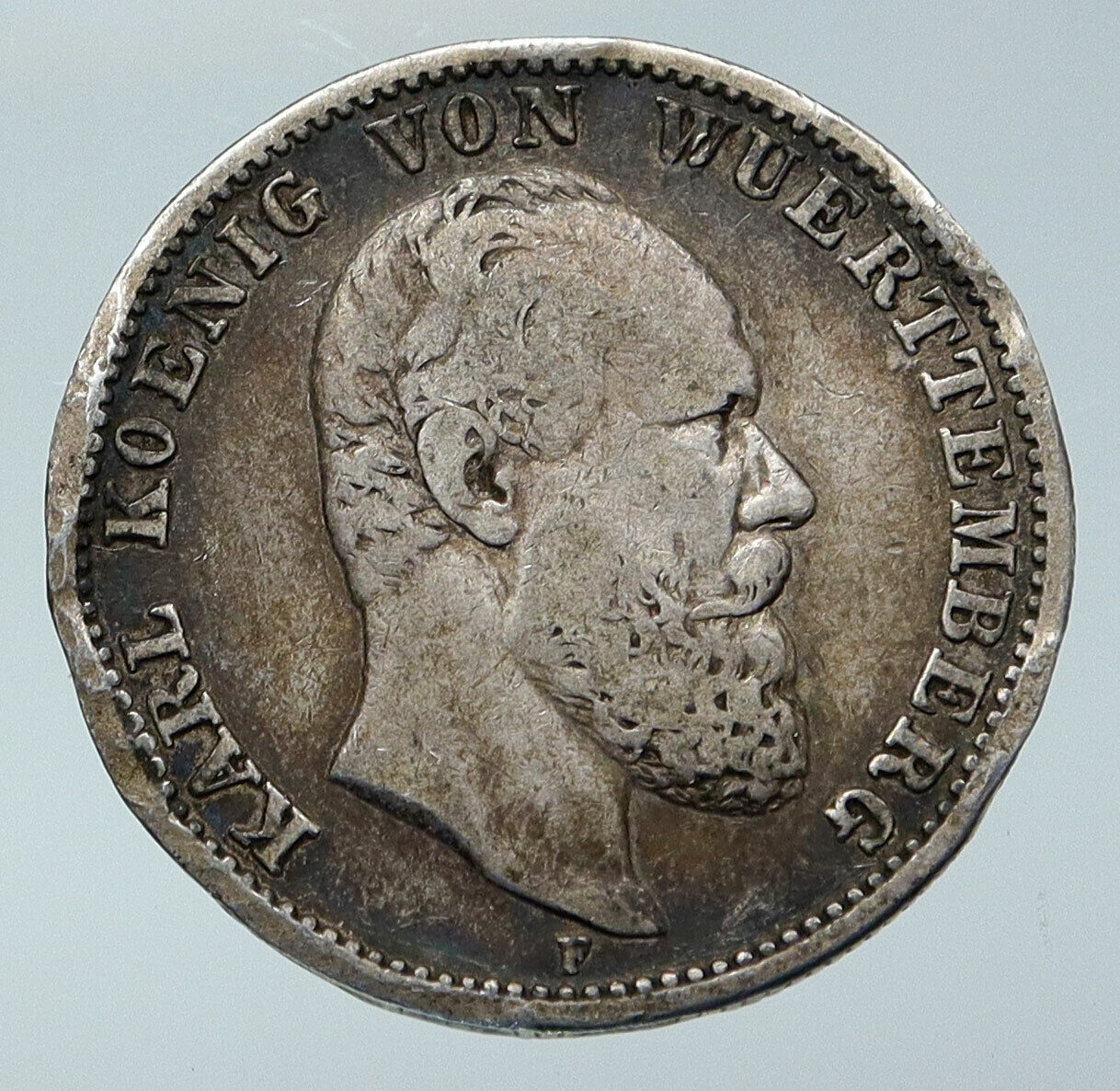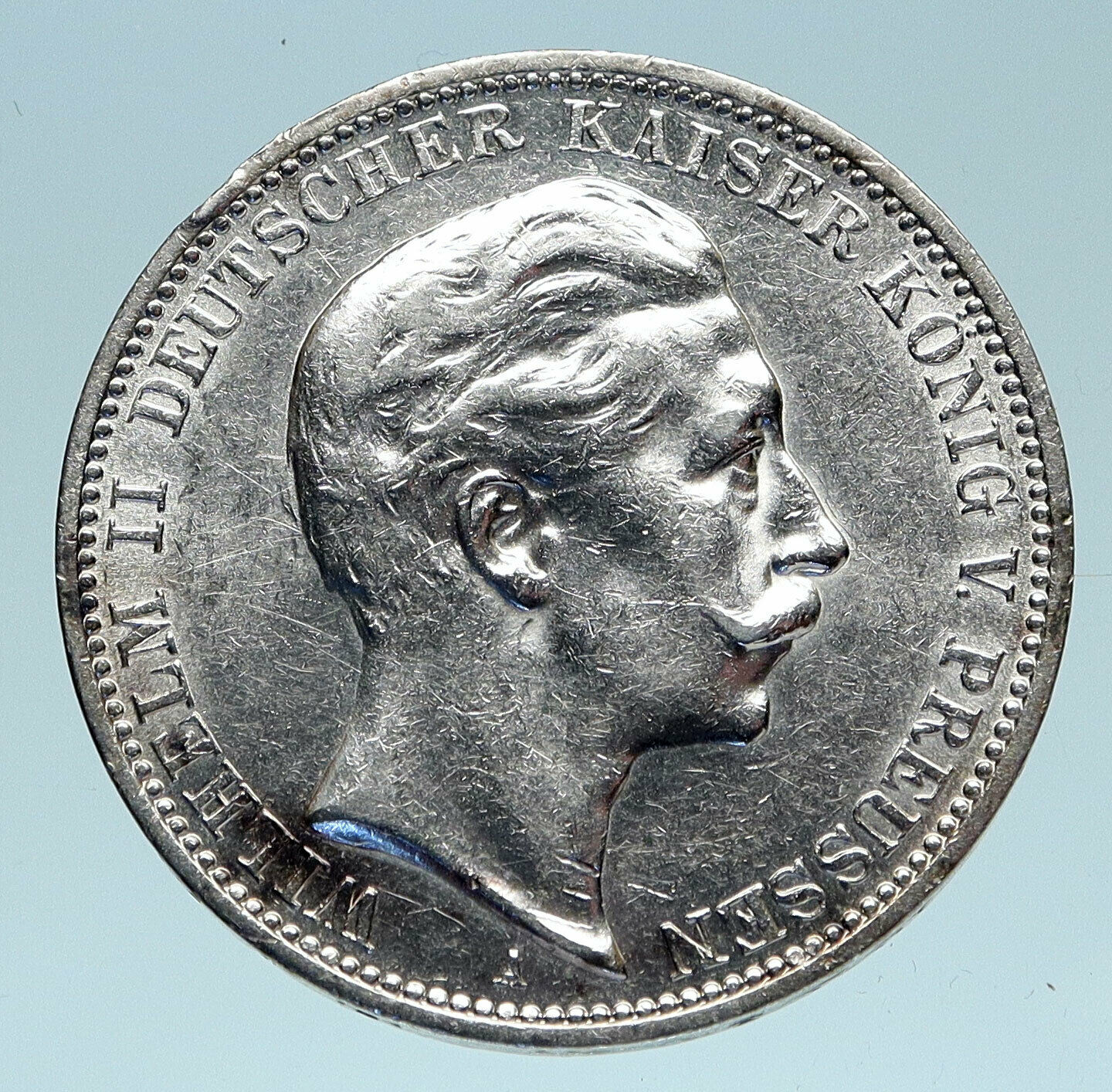|
Germany – German States – Nassau
Adolphe – Duke of Nassau: 20 August 1839 – 20 September 1866
1860 Silver Thaler (Konventionstaler) 33mm (18.40 grams) 0.900 Silver (0.5359 oz. ASW)
Reference: KM# 75, AKS# 63, J# 60, Dav ECT# 747 (1859-60)
ADOLPH HERZOG ZU NASSAU., Bust facing left.
EIN VEREINSTHALER XXX EIN PFUND FEIN 18, Crowned arms supported by two lions over pedestal.
Edge Lettering:
MÜNZVERTRAG VOM 24 JANUAR 1857 *
You are bidding on the exact item pictured, provided with a Certificate of Authenticity and Lifetime Guarantee of Authenticity.
 Adolphe (Adolf Wilhelm August Karl Friedrich; 24 July 1817 – 17 November 1905) was Grand Duke of Luxembourg from 23 November 1890 to his death. The first grand duke from the House of Nassau-Weilburg, he succeeded King William III of the Netherlands, ending the personal union between the Netherlands and Luxembourg. Adolphe was Duke of Nassau from 20 August 1839 to 20 September 1866, when the Duchy was annexed to the Kingdom of Prussia. Adolphe (Adolf Wilhelm August Karl Friedrich; 24 July 1817 – 17 November 1905) was Grand Duke of Luxembourg from 23 November 1890 to his death. The first grand duke from the House of Nassau-Weilburg, he succeeded King William III of the Netherlands, ending the personal union between the Netherlands and Luxembourg. Adolphe was Duke of Nassau from 20 August 1839 to 20 September 1866, when the Duchy was annexed to the Kingdom of Prussia.
Adolphe became Duke of Nassau in August 1839, following the death of his father William. The Duchy was annexed to Prussia after Austria’s defeat in the Austro-Prussian War. From 1815 to 1839, Grand Duchy of Luxembourg was ruled by the kings of the Netherlands as a province of the Netherlands. Following the Treaty of London (1839), the Grand Duchy of Luxembourg became independent but remained in personal union with the Netherlands. Following the death of his sons, the Dutch king William III had no male heirs to succeed him. In the Netherlands, females were allowed to succeed to the throne. Luxembourg, however, followed Salic law which barred females from succession. Thus, upon King William III’s death, the crown of the Netherlands passed to his only daughter, Wilhelmina, while that of Luxembourg passed to Adolphe in accordance with the Nassau Family Pact. Adolphe died in 1905 and was succeeded by his son, William IV.
  Germany, officially the Federal Republic of Germany is a federal parliamentary republic in western-central Europe. It includes 16 constituent states and covers an area of 357,021 square kilometres (137,847 sq mi) with a largely temperate seasonal climate. Its capital and largest city is Berlin. With 81 million inhabitants, Germany is the most populous member state in the European Union. After the United States, it is the second most popular migration destination in the world. Germany, officially the Federal Republic of Germany is a federal parliamentary republic in western-central Europe. It includes 16 constituent states and covers an area of 357,021 square kilometres (137,847 sq mi) with a largely temperate seasonal climate. Its capital and largest city is Berlin. With 81 million inhabitants, Germany is the most populous member state in the European Union. After the United States, it is the second most popular migration destination in the world.
Various Germanic tribes have occupied northern Germany since classical antiquity. A region named Germania was documented before 100 CE. During the Migration Period the Germanic tribes expanded southward. Beginning in the 10th century, German territories formed a central part of the Holy Roman Empire. During the 16th century, northern German regions became the centre of the Protestant Reformation.
The rise of Pan-Germanism inside the German Confederation resulted in the unification of most of the German states in 1871 into the Prussian-dominated German Empire. After World War I and the German Revolution of 1918-1919, the Empire was replaced by the parliamentary Weimar Republic. The establishment of the Third Reich in 1933 led to World War II and the Holocaust. After 1945, Germany split into two states, East Germany and West Germany. In 1990, the country was reunified.
 In the 21st century, Germany is a great power and has the world’s fourth-largest economy by nominal GDP, as well as the fifth-largest by PPP. As a global leader in several industrial and technological sectors, it is both the world’s third-largest exporter and importer of goods. Germany is a developed country with a very high standard of living sustained by a skilled and productive society. It upholds a social security and universal health care system, environmental protection and a tuition free university education. In the 21st century, Germany is a great power and has the world’s fourth-largest economy by nominal GDP, as well as the fifth-largest by PPP. As a global leader in several industrial and technological sectors, it is both the world’s third-largest exporter and importer of goods. Germany is a developed country with a very high standard of living sustained by a skilled and productive society. It upholds a social security and universal health care system, environmental protection and a tuition free university education.
Germany was a founding member of the European Union in 1993. It is part of the Schengen Area, and became a co-founder of the Eurozone in 1999. Germany is a member of the United Nations, NATO, the G8, the G20, and the OECD. The national military expenditure is the 9th highest in the world. Known for its rich cultural history, Germany has been continuously the home of influential artists, philosophers, musicians, sportsmen, entrepreneurs, scientists and inventors.
|





 Adolphe (Adolf Wilhelm August Karl Friedrich; 24 July 1817 – 17 November 1905) was Grand Duke of Luxembourg from 23 November 1890 to his death. The first grand duke from the House of Nassau-Weilburg, he succeeded King William III of the Netherlands, ending the personal union between the Netherlands and Luxembourg. Adolphe was Duke of Nassau from 20 August 1839 to 20 September 1866, when the Duchy was annexed to the Kingdom of Prussia.
Adolphe (Adolf Wilhelm August Karl Friedrich; 24 July 1817 – 17 November 1905) was Grand Duke of Luxembourg from 23 November 1890 to his death. The first grand duke from the House of Nassau-Weilburg, he succeeded King William III of the Netherlands, ending the personal union between the Netherlands and Luxembourg. Adolphe was Duke of Nassau from 20 August 1839 to 20 September 1866, when the Duchy was annexed to the Kingdom of Prussia.
 Germany, officially the Federal Republic of Germany is a federal parliamentary republic in western-central Europe. It includes 16 constituent states and covers an area of 357,021 square kilometres (137,847 sq mi) with a largely temperate seasonal climate. Its capital and largest city is Berlin. With 81 million inhabitants, Germany is the most populous member state in the European Union. After the United States, it is the second most popular migration destination in the world.
Germany, officially the Federal Republic of Germany is a federal parliamentary republic in western-central Europe. It includes 16 constituent states and covers an area of 357,021 square kilometres (137,847 sq mi) with a largely temperate seasonal climate. Its capital and largest city is Berlin. With 81 million inhabitants, Germany is the most populous member state in the European Union. After the United States, it is the second most popular migration destination in the world. In the 21st century, Germany is a great power and has the world’s fourth-largest economy by nominal GDP, as well as the fifth-largest by PPP. As a global leader in several industrial and technological sectors, it is both the world’s third-largest exporter and importer of goods. Germany is a developed country with a very high standard of living sustained by a skilled and productive society. It upholds a social security and universal health care system, environmental protection and a tuition free university education.
In the 21st century, Germany is a great power and has the world’s fourth-largest economy by nominal GDP, as well as the fifth-largest by PPP. As a global leader in several industrial and technological sectors, it is both the world’s third-largest exporter and importer of goods. Germany is a developed country with a very high standard of living sustained by a skilled and productive society. It upholds a social security and universal health care system, environmental protection and a tuition free university education.




